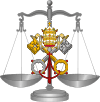Ecclesia Dei
 |
| Part of a series on the |
| Jurisprudence of Catholic canon law |
|---|
|
|
|
Trials and tribunals |
|
Canonical structures Particular churches
|
|
|
Ecclesia Dei is the incipit of the motu proprio of 2 July 1988 that Pope John Paul II issued in reaction to the consecration, in spite of an express prohibition by the Holy See, of four bishops by Archbishop Marcel Lefebvre and Bishop Antônio de Castro Mayer in Écône, Switzerland, at the seminary of the Society of St. Pius X (SSPX), an association of priests that Archbishop Lefebvre had founded in 1970 and whose members distrusted the changes then taking place in the Church.
Excommunication of the bishops involved
Referring to Archbishop Lefebvre's action, the Pope declared in the motu proprio: "In itself, this act was one of disobedience to the Roman Pontiff in a very grave matter and of supreme importance for the unity of the Church, such as is the ordination of bishops whereby the apostolic succession is sacramentally perpetuated. Hence such disobedience – which implies in practice the rejection of the Roman primacy – constitutes a schismatic act (cf. Code of Canon Law, can. 751). In performing such an act, notwithstanding the formal canonical warning sent to them by the Cardinal Prefect of the Congregation for Bishops on 17 June last, Mons. Lefebvre and the priests Bernard Fellay, Bernard Tissier de Mallerais, Richard Williamson and Alfonso de Galarreta have incurred the grave penalty of excommunication envisaged by ecclesiastical law (cf. Code of Canon Law, can. 1382)."[1]
Followers of Archbishop Lefebvre
Pope John Paul II went on to make "an appeal both solemn and heartfelt, paternal and fraternal, to all those who until now have been linked in various ways to the movement of Archbishop Lefebvre, that they may fulfil the grave duty of remaining united to the Vicar of Christ in the unity of the Catholic Church, and of ceasing their support in any way for that movement. Everyone should be aware that formal adherence to the schism is a grave offence against God and carries the penalty of excommunication decreed by the Church's law (cf. Code of Canon Law, can. 1364)."[2]
The Pope instituted the Pontifical Commission Ecclesia Dei to assist those who had been associated with Archbishop Lefebvre but who wished "to remain united to the Successor of Peter in the Catholic Church, while preserving their spiritual and liturgical traditions, in the light of the Protocol signed on 5 May last by Cardinal Ratzinger and Mons. Lefebvre", [3] a protocol that Archbishop Lefebvre later repudiated.
Use of the Tridentine Mass
The Pope stated: "Respect must everywhere be shown for the feelings of all those who are attached to the Latin liturgical tradition, by a wide and generous application of the directives already issued some time ago by the Apostolic See for the use of the Roman Missal according to the typical edition of 1962". In this the Pope expanded the scope of permission already granted under the 1984 special indult Quattuor Abhinc Annos.[4]
The conditions indicated in the document to which Pope John Paul referred were replaced on 7 July 2007 by those indicated in the motu proprio Summorum Pontificum.[5]
See also
- On controversy over the declaration of excommunication, see the article on Archbishop Lefebvre.
- On subsequent developments concerning the Society of St Pius X and its relations with the Holy See, including the lifting of the excommunication of the four bishops of the Society in 2009, see the article on the Society.
- On the circular letter of 3 October 1984, whose directives Pope John Paul II wished to be applied widely and generously, see Quattuor abhinc annos.
References
- ↑ Ecclesia Dei, 3
- ↑ Ecclesia Dei, 5 c)
- ↑ Ecclesia Dei, 6 a)
- ↑ Congregation for Divine Worship, Letter Quattuor abhinc annos. 3 Oct. 1984: AAS 76 (1984) pp. 1088-1089)
- ↑ Summorum Pontificum, article 1